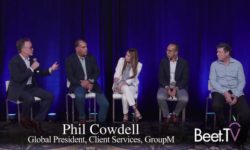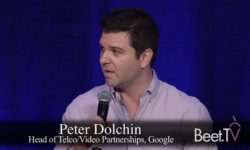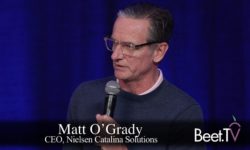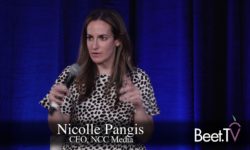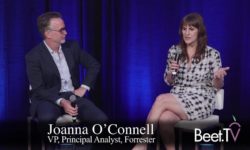SAN JUAN, Puerto Rico—As traditional television networks weigh the benefits of completely upending their business models, they also find themselves as middlemen of sorts between advertisers and agencies. This is the view of Ethan Heftman, VP, Precision/Performance, A+E Networks, who notes “a bit of a bifurcation, a division between what brands want and what the agencies need to deliver.”
In this interview at the recent Beet Retreat 2018, Heftman elaborates on networks’ mediator-like role in trying to please both advertisers and agencies in an increasing complex, consumer-led TV universe.
Brands are talking about business results like topline growth, better metrics and greater ROI. “When we talk to agencies, obviously agencies are intimately involved in that but ultimately agencies are also judged on a cost efficiency basis,” Heftman says. “And so that necessarily creates a bit of friction in the conversations that we have between brands, agencies and ourselves.”
Increasingly, the seller’s role “is being a bit in the middle of that,” he adds. “Making sure that we are delivering the cost efficiency and proper business rationale to our agency business partners, while working with brands to try and convince them that television in particular is a driver of their business. We never really had to do that historically. The agencies took care of that for us.”
He isn’t suggesting that some agencies don’t tell that story to their clients. But given the roadblocks that exist to connecting television to business outcomes, “it’s not necessarily the best decision to let somebody else do that for us. We have to take some of the lead on that ourselves.”
Heftman sees more marketers than agencies leading the way on innovating new forms of ad products, one reason being it’s not a skill set that one necessarily finds within agencies. “Sometimes it is faster to go straight to the client and work with them on something that works for their business.” This is particularly true for newer, direct-to-consumer brands that might not have a legacy relationship with an agency. “They simply have different expectations from television, and part of working with them is that it has gotten us up to speed in talking more about outcomes and different types of creative and different types of executions that are going to get use there.”
He’d like to see two things going forward. First, realistic acknowledgement that big changes aren’t going to happen overnight, and second an understanding that TV serves certain purposes that can be “a little bit dual” in nature. “I would like to see clients and agencies spend more time thinking about their funnels and really being honest about the places where TV fits into the funnel and things that it has to do to succeed there,” Heftman says.
“I think the sooner we get to a place where we are honest about what each different format can do, that’s going to get us closer to where we’re headed.”
This video was produced in San Juan, Puerto Rico at the Beet.TV executive retreat. Please find more videos from the series on this page. The Beet Retreat was presented by NCC along with Amobee, Dish Media, Oath and Google.







